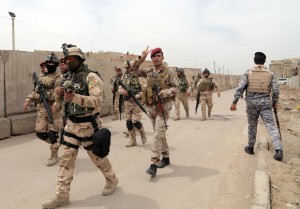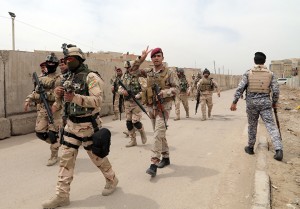

By Hamza Hendawi
Associated Press
BAGHDAD — Blast barrier walls topped with barbed wire snake across the Iraqi capital, encircling government buildings like a fortress and enshrining the separation of neighborhoods increasingly divided by religious sect.
As parliamentary elections are held this week more than two years after the withdrawal of U.S. troops, Baghdad is once again a city gripped by fear and scarred by violence. Many of the city’s 7 million residents avoid roads hit by bombings, fearing a deadly repeat. Most shops now close shortly after sunset, and an overnight curfew that begins at midnight remains in force.
On Monday, suspected Sunni militants struck checkpoints outside polling stations across Baghdad and much of the country, as army and police personnel voted two days before the rest of Iraq’s 22 million registered voters cast their ballots on Wednesday. At least 21 people were killed in the suicide bombings and other attacks.
Despite a surge in violence engulfing the country over the past year, Prime Minister Nouri al-Maliki’s election coalition is expected to win and propel him to a third, four-year term in office. Al-Maliki’s campaign has cast him as a strong statesman who has kept the country together through tough times, a view rejected by many Sunnis who see him as a sectarian politician.
Baghdad’s division along sectarian lines, a legacy of the last decade’s Sunni-Shiite bloodletting, is now deeply enshrined and, to hardliners on both sides, is how things should be. Most of the hundreds of thousands of mostly Sunni Baghdadis who fled the capital have yet to come back, finding relative peace abroad in Arab cities like Amman, Dubai and Beirut.
Some of the campaign posters for Wednesday’s parliamentary election are promising better days for the city — jobs, security and an end to graft. But many residents don’t believe such promises, instead distrusting politicians as corrupt or inept.
“It is only now that it is election season that we hear from politicians,” said Zeid Ibrahim Ahmed, a 47-year-old Sunni barber from Baghdad’s mostly Sunni Azamiyah neighborhood. “But for four years they failed to do anything useful. The only change we might see in Iraq after the election is that we will move from bad to worse.”






